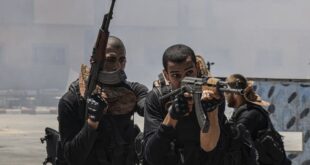 GAZA (Reuters) — The Fateh faction of Palestinian President Mahmoud Abbas and the Hamas group agreed on Wednesday to halt their clashes even as they headed for a showdown over Abbas’s threat to hold a referendum on a statehood proposal.
GAZA (Reuters) — The Fateh faction of Palestinian President Mahmoud Abbas and the Hamas group agreed on Wednesday to halt their clashes even as they headed for a showdown over Abbas’s threat to hold a referendum on a statehood proposal.
Violence flared at the Gaza border with Israel as Israeli troops shot dead a Palestinian policeman and two civilians and wounded five other people, medics and witnesses said.
The Israeli army said troops opened fire at three men they suspected were trying to infiltrate the tense frontier near the Karni commercial crossing.
Witnesses said the troops fired more than once and shot artillery and a missile from a pilotless drone. Medics said some of the injuries suggested artillery fire was used. The army denied using artillery fire.
Israeli troops have increased their vigilance along the border amid an upsurge in rocket firings from Gaza. A rocket hurt an Israeli woman when it slammed into a home on Tuesday.
Israel responded by an aerial bombing of a rocket depot in Gaza.
Witnesses said Israeli artillery gunners also pounded other parts of Gaza, in an apparent response to rocket launchings, setting off loud explosions.
Abbas has given the Hamas government until the end of the week to accept a manifesto calling for a Palestinian state that implicitly recognises Israel or face a vote on the issue.
Hamas trounced Fateh in January parliamentary elections and has been locked in a power struggle with Abbas ever since.
The president would issue a decree on Saturday setting the stage for the referendum if the Hamas Islamists still refused to back the proposal, Abbas’ spokesman Nabil Abu Rdainah said.
With shootouts between Hamas and Fateh now frequent, many Palestinians fear a referendum could trigger more violence.
But after a meeting in the impoverished Gaza Strip brokered by Egyptian officials, Fateh and Hamas leaders urged calm.
“We order men from Fateh and Hamas to respect the holiness of Palestinian blood,” said Khalil Al-Hayya, a Hamas leader.
Fateh lawmaker Majed Abu Shammala said both sides hoped to end internal violence that has killed nearly 20 people in Gaza in the past month. Previous agreements to end factional bloodshed have not lasted long.
A government spokesman, Ghazi Hamad, said members of a 3,000-strong new paramilitary force set up by Hamas would be pulled off Gaza’s streets and redeployed to limited locations to ease tensions.
The force inaugurated last month despite Abbas’ opposition, has been a key source of tension with Fateh.
Confidence vote
The Islamists, who refuse to recognise Israel, reject the statehood manifesto penned by prisoners in an Israeli jail and say a referendum would be illegal so soon after elections.
“Palestinian law does not give the president the right to hold a referendum,” a Hamas spokesman said in response to Abbas’ plan to issue a decree for the vote.
“If the decision is made, we will express our rejection by the means we see suitable,” Abu-Zuhri added.
Abbas, a moderate elected separately in early 2005, had set a Tuesday deadline for the Islamists to embrace the manifesto but held off after appeals by Arab leaders.
A referendum would be seen as a confidence vote on the Hamas government, whose election led the West and Israel to cut off funds to the Palestinian Authority.
The document implicitly recognises Israel in its call for a Palestinian state on all of the West Bank and Gaza Strip, which Israel captured in the 1967 Middle East war.
The European Union has proposed an aid mechanism to avoid a collapse of crucial services to Palestinians despite a world financial boycott of the Hamas-led government.
A copy of the proposal obtained by Reuters calls for a monthly $42 million, including funds for civil servants not paid since the aid freeze.
It needs the approval of the Quartet of Middle East mediators — the United States, Russia and the United Nations.
 Eurasia Press & News
Eurasia Press & News
